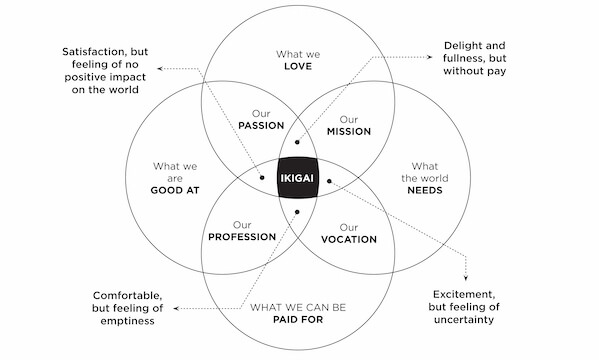This is my second blog about ikigai. This time I’m writing about it from the aspect of how it can help lead to a higher life-expectancy rate. I realise this is off my usual topic of careers. However, the two are related, as when thinking about planning out your life, your decisions lead you to choose a lifestyle that is workable around, …well… work!
What do the principles of ikigai mean for choosing a lifestyle?
Ikigai encourages us to pay attention to having an active mind and healthy body. The loose translation of ikigai as the ‘happiness of always being busy’, is key. You can try to get into ‘flow’, (see my first blog on ikigai to read about this) as much as possible. This will be achieved by working on tasks that are purposeful. When you do this, you’ll find the popular refrain ‘time flies when you’re having fun’, will become true.
The mental health significance of ikigai with respect to aging
In the same way a lack of physical exercise can lead to a low mood and can have a negative effect on both the mind and the body, a lack of mental exercise is bad for us. Neuroscience has led to an improved understanding of how our brain works. It has shown via MRI scans that if we don’t keep up seeking new experiences and learning, our neurons and neural connections deteriorate. When introduced to new information, the brain creates new connections and therefore, the process of aging is slowed down. It is by learning new stuff and by keeping alive your curiosity and intellectual stimulation that you can do this. It is therefore important to try new things and to step out of your comfort zone from time to time. With a new task, whilst it may seem difficult the first time, when you keep at it, it gets easier. This also can have a huge positive effect on your mood. Seeing progression and transformation in our lives, translates into increased self-esteem.
Ikigai very much ties in with positive psychology and mindsets. Positive psychology focuses on finding your strengths and using them to their best effect. Ikigai gets you to think about first what you are good at (i.e. your strengths), but also what you enjoy, so it has this added dimension. This is your ‘half ikigai’, which I spoke of in my last blog. It also encourages you to try to seek out more of these areas. Therefore, trying out different ideas, experimenting and learning new things are all part and parcel of what ikigai is all about.
Avoiding too much stress can help to increase life expectancy
It is well-known that stress is the cause of many health problems. It promotes cellular ageing and studies by the University of California have shown that the greater the stress, the higher the degenerative effect on cells. So it definitely seems to have an affect on higher life expectancy. I have written about stress before and the biochemical reactions that it can have on the body, making it release more adrenaline and cortisol.
Therefore, it’s good to be mindful about being over-stressed. Try to slow down, find some serenity and turn off your auto-pilot when you start to think of negative spiralling thoughts. To notice when you are doing this, is the first step.
Research studies from the University of California have shown that having some stress is good, but maintaining this at a low level will generally increase life-expectancy. This is true especially when people have put their heart and soul into their work.
This is where knowing your Ikigai can help.
The ‘Blue Zones’
In the early 2000s, Dan Buettner gave popularity to the concept of ‘Blue Zones’, i.e. areas of the world where people live longer, healthier lives, though the concept had been around before that. You can read an article about him online: https://www.insider.com/blue-zones-dan-buettner-long-life-diet-exercise-2019-12
There are five ‘blue zones’ around the world. They are in regions of Japan, Italy, Costa Rica, Greece and California. In these areas is not unusual to find people living beyond 100. They also tend to avoid dementia.
The following aspects seem to be important:
- getting sufficient sleep
- not sitting for long periods, so therefore, moving about every 20 minutes
- a whole grain/whole food diet
- a positive, as well as a stoic attitude
- emotional awareness
- having friends around you.
Ikigai taps into these aspects and is also about finding your purpose in life. Your career is an important aspect of this.
You may be interested in reading my other article on Ikigai – Ikigai and Purpose

